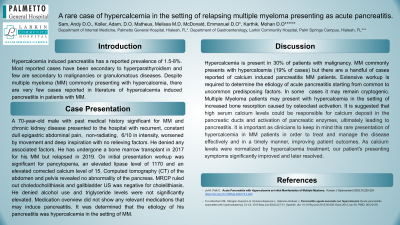Back


Poster Session E - Tuesday Afternoon
Category: Biliary/Pancreas
E0035 - A Rare Case of Hypercalcemia in the Setting of Relapsing Multiple Myeloma Presenting as Acute Pancreatitis
Tuesday, October 25, 2022
3:00 PM – 5:00 PM ET
Location: Crown Ballroom

Has Audio

Andy Sam, DO
Palmetto General Hospital
Hialeah, FL
Presenting Author(s)
Andy Sam, DO1, Adam Z. Koller, DO, MS1, Melissa Matheus, MD1, Emmanuel McDonald, DO2, Karthik Mohan, DO1
1Palmetto General Hospital, Hialeah, FL; 2Larkin Community Hospital, Hialeah, FL
Introduction: Hypercalcemia induced pancreatitis has a reported prevalence of 1.5-8%. Most reported cases have been secondary to hyperparathyroidism and few are secondary to malignancies or granulomatous diseases. Despite multiple myeloma (MM) commonly presenting with hypercalcemia, there are very few cases reported in literature of hypercalcemia induced pancreatitis in patients with MM.
Case Description/Methods: A 70-year-old male with past medical history significant for MM and chronic kidney disease presented to the hospital with recurrent, constant dull epigastric abdominal pain, non-radiating, 6/10 in intensity, worsened by movement and deep inspiration with no relieving factors. He denied any associated factors. He has undergone a bone marrow transplant in 2017 for his MM but relapsed in 2019. On initial presentation workup was significant for pancytopenia, an elevated lipase level of 1170 and an elevated corrected calcium level of 15. Computed tomography (CT) of the abdomen and pelvis revealed no abnormality of the pancreas. MRCP ruled out choledocholithiasis and gallbladder US was negative for cholelithiasis. He denied alcohol use and triglyceride levels were not significantly elevated. Medication overview did not show any relevant medications that may induce pancreatitis. It was determined that the etiology of his pancreatitis was hypercalcemia in the setting of MM.
Discussion: Hypercalcemia is present in 30% of patients with malignancy. MM commonly presents with hypercalcemia (19% of cases) but there are a handful of cases reported of calcium induced pancreatitis MM patients. Extensive workup is required to determine the etiology of acute pancreatitis starting from common to uncommon predisposing factors. In some cases it may remain cryptogenic. Multiple Myeloma patients may present with hypercalcemia in the setting of increased bone resorption caused by osteoclast activation. It is suggested that high serum calcium levels could be responsible for calcium deposit in the pancreatic ducts and activation of pancreatic enzymes, ultimately leading to pancreatitis. It is important as clinicians to keep in mind this rare presentation of hypercalcemia in MM patients in order to treat and manage the disease effectively and in a timely manner, improving patient outcomes. As calcium levels were normalized by hypercalcemia treatment, our patient's presenting symptoms significantly improved and later resolved.
Disclosures:
Andy Sam, DO1, Adam Z. Koller, DO, MS1, Melissa Matheus, MD1, Emmanuel McDonald, DO2, Karthik Mohan, DO1. E0035 - A Rare Case of Hypercalcemia in the Setting of Relapsing Multiple Myeloma Presenting as Acute Pancreatitis, ACG 2022 Annual Scientific Meeting Abstracts. Charlotte, NC: American College of Gastroenterology.
1Palmetto General Hospital, Hialeah, FL; 2Larkin Community Hospital, Hialeah, FL
Introduction: Hypercalcemia induced pancreatitis has a reported prevalence of 1.5-8%. Most reported cases have been secondary to hyperparathyroidism and few are secondary to malignancies or granulomatous diseases. Despite multiple myeloma (MM) commonly presenting with hypercalcemia, there are very few cases reported in literature of hypercalcemia induced pancreatitis in patients with MM.
Case Description/Methods: A 70-year-old male with past medical history significant for MM and chronic kidney disease presented to the hospital with recurrent, constant dull epigastric abdominal pain, non-radiating, 6/10 in intensity, worsened by movement and deep inspiration with no relieving factors. He denied any associated factors. He has undergone a bone marrow transplant in 2017 for his MM but relapsed in 2019. On initial presentation workup was significant for pancytopenia, an elevated lipase level of 1170 and an elevated corrected calcium level of 15. Computed tomography (CT) of the abdomen and pelvis revealed no abnormality of the pancreas. MRCP ruled out choledocholithiasis and gallbladder US was negative for cholelithiasis. He denied alcohol use and triglyceride levels were not significantly elevated. Medication overview did not show any relevant medications that may induce pancreatitis. It was determined that the etiology of his pancreatitis was hypercalcemia in the setting of MM.
Discussion: Hypercalcemia is present in 30% of patients with malignancy. MM commonly presents with hypercalcemia (19% of cases) but there are a handful of cases reported of calcium induced pancreatitis MM patients. Extensive workup is required to determine the etiology of acute pancreatitis starting from common to uncommon predisposing factors. In some cases it may remain cryptogenic. Multiple Myeloma patients may present with hypercalcemia in the setting of increased bone resorption caused by osteoclast activation. It is suggested that high serum calcium levels could be responsible for calcium deposit in the pancreatic ducts and activation of pancreatic enzymes, ultimately leading to pancreatitis. It is important as clinicians to keep in mind this rare presentation of hypercalcemia in MM patients in order to treat and manage the disease effectively and in a timely manner, improving patient outcomes. As calcium levels were normalized by hypercalcemia treatment, our patient's presenting symptoms significantly improved and later resolved.
Disclosures:
Andy Sam indicated no relevant financial relationships.
Adam Koller indicated no relevant financial relationships.
Melissa Matheus indicated no relevant financial relationships.
Emmanuel McDonald indicated no relevant financial relationships.
Karthik Mohan indicated no relevant financial relationships.
Andy Sam, DO1, Adam Z. Koller, DO, MS1, Melissa Matheus, MD1, Emmanuel McDonald, DO2, Karthik Mohan, DO1. E0035 - A Rare Case of Hypercalcemia in the Setting of Relapsing Multiple Myeloma Presenting as Acute Pancreatitis, ACG 2022 Annual Scientific Meeting Abstracts. Charlotte, NC: American College of Gastroenterology.
